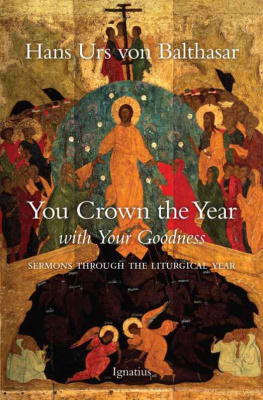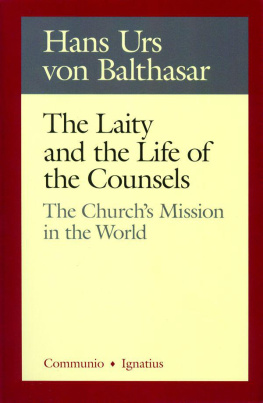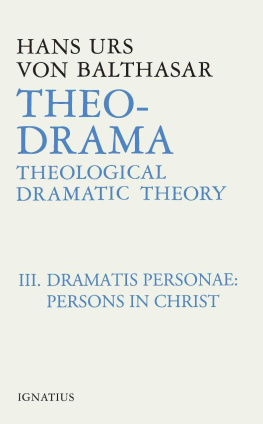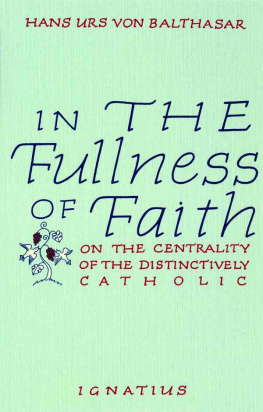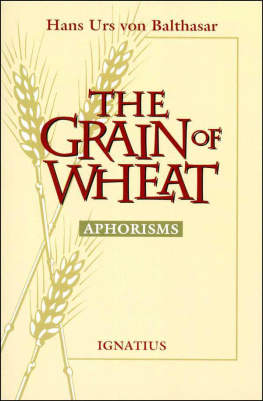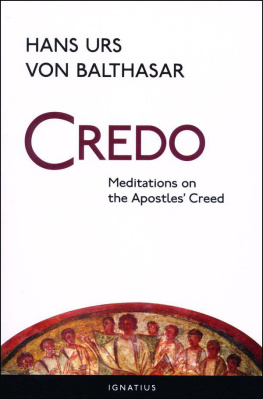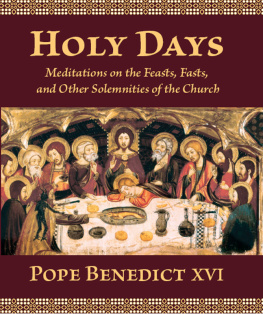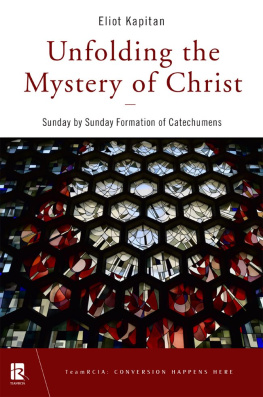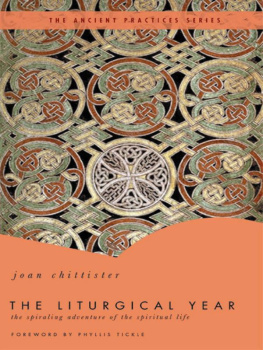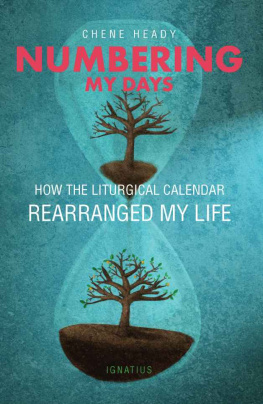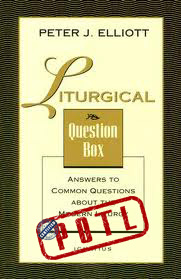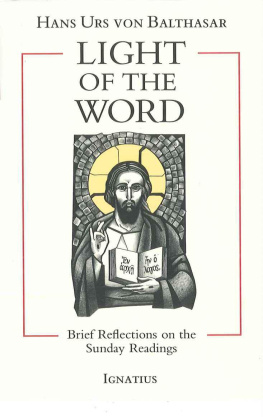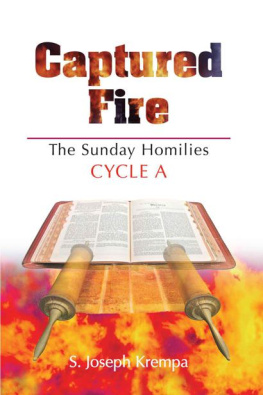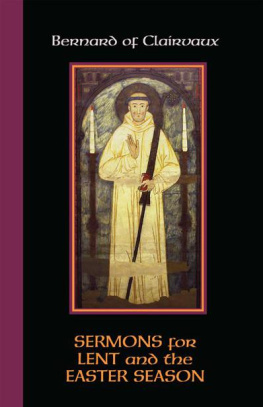You Crown the Year with Your Goodness
HANS URS VON BALTHASAR
You Crown the Year with Your Goodness
Radio Sermons
Translated by Graham Harrison
IGNATIUS PRESS SAN FRANCISCO
Title of the German original:
Du kronst das Jahr mit deiner Huld: Radiopredigten
1982 Johannes Verlag
Einsiedeln
Cover art:
Descent into Limbo . Russian icon.
Dionisij (1440-1510)
Russian State Museum, St. Petersburg, Russia
Scala / Art Resource, New York
Cover design by Roxanne Mei Lum
With ecclesiastical approval
Ignatius Press, San Francisco
All rights reserved
ISBN 978-0-89870-058-9
Library of Congress catalogue number 89-83743
Printed in the United States of America
Contents
Preface
These radio homilies, broadcast over a period of several decades, were collected and arranged solely according to their place in the Churchs calendar. This selection concerns the feasts of God, of Christ and of his Mother; the feasts of the saints could fill another volume: this one is already large enough. Naturally there is nothing systematic about the order in which the homilies appear, unless, that is, they are viewed from a higher perspective: then, indeed, constant themes do emergeperhaps only a single themeof which the individual items are only variations. For in the Christian Faith, after all, there is only one dogma, splitting like light into a rainbow of colors, or, like a living body, expressing itself in manifold members, each dependent on the others. Just as we cannot understand anything of Christ apart from the mystery of the Trinity, anything of the Church without faith in Christs divinity and humanity, anything of the sacraments apart from the bridal mystery between Christ and the Church, so too we cannot understand anything of the Christian life (or morality) without the Christian Faith (or dogma): orthopraxy and orthodoxy are two sides of the same coin.
So it is that these homilies keep circling around the same center: the inexhaustible mystery of our one, indivisible Faith. Each piece was written for a particular occasion and, relatively speaking, stands on its own; consequently, it would be tiresome to read through the whole book as one would read a novel or a textbook. It is best to open it at random or to pick a topic and then read at most a couple of homilies. In that way the inevitable overlappings will not cause irritation. In all cases what we have written should be tested by the plumb line of the Word of God. Many readers, quite probably, would have preferred something more practical, but human praxis practically arises of itself, once we have adequately appreciated Gods own praxis. No sermon or homily can or should have any other subject matter but the One Word, uniquely manifested every Sunday, every feast day.
New Year
To and Fro in the Immensity
of Gods Realm
We ended the old year with thanksgiving to God, and we begin the new with the worship of him. Worship means acknowledging Gods divine nature, his absolute power and goodness. Whatever may be in store for us in the new year, we live in him , within the sphere of his kindly power and mighty kindness, from which nothing can fall away. We can put it in the words of a psalm that has been inserted at the beginning of the First Book of Samuel; it starts like this: My heart exults in the Lord; my strength is exalted.... There is none holy like the Lord, there is none besides thee. There is no such thing as a plurality of gods (for every man, including every religious man, whether he knows it or not, is subject to the One, All-Holy God), nor is there any power in the world that can make itself independent of his power and act as if it were almighty. True, the world contains people who are lofty and lowly, the powerful and the powerless, the fruitful and the sterile, the energetic and those lacking in strength; and we are acquainted with the terrifying contrasts of victory and defeat, of life and death. Full of fear, we sail back and forth on lifes swing without being able to stop it, and the only thing we are certain of is that one day the swing on which our life is sailing to and fro must arc over, out of the light into the darkness, and this time there will be no swinging back.
But now the psalmist is emboldened to comprehend all these contraries between which we hover (as individuals, but also as nations and continents and power blocs, threatening each other with atom bombs); he has the courage to grasp all this as something that takes place within the One, almighty, all-knowing and kind God, who is eternal and all-powerful life and thus can embrace and relativize all our contraries. Let us listen to what he says:
For the Lord is a God of knowledge,
and by him actions are weighed.
The bows of the mighty are broken,
but the feeble gird on strength.
Those who were full have hired themselves out for bread,
but those who were hungry have ceased to hunger.
The barren has borne seven,
but she who has many children is forlorn.
The Lord kills and brings to life;
he brings down to Sheol and raises up.
The Lord makes poor and makes rich;
he brings low, he also exalts.
He raises up the poor from the dust;
he lifts the needy from the ash heap,
to make them sit with princes and inherit a seat of honor.
For the pillars of the earth are the Lords,
and on them he has set the world.
These are staggering words. They go further than our reflections so far. They say that all the ups and downs of individual and national fortunes are acted out within an all-embracing divine sphere. Furthermore, and most importantly, they affirm that this sphere is the living God, who intervenes to reverse the apparently irreversible human value judgments and make them conform to his own, absolute evaluations. At this point the biblical view of God diverges from most religious and philosophical world views: it is not simply that the earthly contradictions are relativized in the face of the absolute, but the living God vindicates his absolute values and evaluations in history itself. Not arbitrarily either, but in accord with his own nature, which, by an inner necessity, demands unconditional recognition. Therefore:
Talk no more so very proudly,
let not arrogance come from your mouth....
The adversaries of the Lord shall be broken to pieces....
He will guard the feet of his faithful ones;
but the wicked shall be cut off in darkness.
We can ask ourselves whether man, even the man who has faith, can observe this law operating in his own history and in the history of the world. Perhaps he cannot see it in the same way that many Old Testament people, and Jobs friends, thought they could. So the psalmists strength of faith that enables him to dare to say these things is all the more amazing. In faith he knows that God lifts the poor from the dust and the mire because by his very nature he shows solidarity with the lowly and humble. Conversely, he knows that if those who have been lifted up become proud and imagine that they have raised themselves up by their own strength, they are bound to fall down again, since such arrogant behavior is in opposition to Gods sublime nature. The psalmist is even aware of something that few under the Old Covenant knew, namely, that God not only causes man to journey to the grave but also brings him up out of it. For God is not a God of the dead but of the living; he himself is eternal life.
But can this faith knowledge on the part of the psalmist stand firm in the face of the harsh realities of human experience? Can it stand up to the cries of Job, who says that God has banished him, guiltless, in the darkest of nights, and that nothing of his kindness, omnipotence and justice is visible anymore?
Next page
